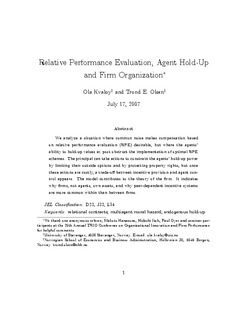| dc.contributor.author | Kvaløy, Ola | |
| dc.contributor.author | Olsen, Trond E. | |
| dc.date.accessioned | 2008-01-21T09:51:37Z | |
| dc.date.available | 2008-01-21T09:51:37Z | |
| dc.date.issued | 2007-07 | |
| dc.identifier.issn | 1500-4066 | |
| dc.identifier.uri | http://hdl.handle.net/11250/163917 | |
| dc.description.abstract | We analyze a situation where common noise makes compensation based on relative performance evaluation (RPE) desirable, but where the agents' ability to hold-up values ex post obstruct the implementation of optimal RPE schemes. The principal can take actions to constrain the agents' hold-up power by limiting their outside options and by protecting property rights, but once these actions are costly, a trade-off between incentive provision and agent control appears. The model contributes to the theory of the firm. It indicates why firms, not agents, own assets, and why peer-dependent incentive systems are more common within than between firms. | en |
| dc.language.iso | eng | en |
| dc.publisher | Norwegian School of Economics and Business Administration. Department of Finance and Management Science | en |
| dc.relation.ispartofseries | Discussion paper | en |
| dc.relation.ispartofseries | 2007:26 | en |
| dc.subject | relational contracts | en |
| dc.subject | multiagent moral hazard | en |
| dc.subject | endogenous hold-up | en |
| dc.title | Relative performance evaluation, agent hold-up and firm organization | en |
| dc.type | Working paper | en |
| dc.subject.nsi | VDP::Samfunnsvitenskap: 200::Økonomi: 210::Bedriftsøkonomi: 213 | en |
